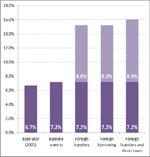UN DESA | DPAD | Development Policy Analysis Division
Capacity Development and Advisory Services
Millennium Development Goals
Senegal highlights
A slow rate of progress towards the MDGs continues
| MDG progress achieved by 2015 under a business-as-usual scenario |
 |
In spite of progress in various social areas targeted by the MDGs, Senegal is unlikely to meet most of the goals if past trends of slow and irregular economic growth and high population expansion continue unchanged until 2015. Under a business-as-usual scenario, Senegal falls short of achieving targets for poverty reduction, maternal mortality, completion of primary education, and access to improved sanitation.
Senegal must scale up public spending to speed up progress towards the MDGs
| Average annual public spending under baseline and alternative MDG-financing strategies |
 |
Senegal's government would need to allocate around 8-9% of GDP in additional spending to ensure that MDG targets for primary education, mortality and access to water and sanitation remain within reach by 2015. Additional spending requirements would be lower (around 8%) if the Government were to finance these using foreign resources. Under a mixed financing strategy that combines raising direct taxes with additional foreign transfers, the requirements for public spending are the highest.
MDG financing can affect Senegal's economy in contrasting ways
 |
Increasing domestic tax collection may be a desirable financing option for the MDGs in Senegal, as the Government would be signalling a strong commitment to meet these goals. Nonetheless, it could have an adverse effect on disposable household incomes, an important determinant in achieving most MDGs. The reduction of private incomes would have to be compensated for by the Government through additional spending, thus increasing the fiscal cost of the MDG strategy. Resorting to foreign borrowing to finance the MDG strategy, on the other hand, would carry the costs of an increasing public debt burden. Additionally, foreign borrowing as well as foreign aid could penalize export growth owing to the appreciation of the real exchange rate that it triggers.
Related documents
- Country study "Assessing Development Strategies to Achieve the MDGs in the Republic of South Africa" (2011).
- Country study "Assessing Development Strategies to Achieve the MDGs in the Republic of Uganda" (2011).